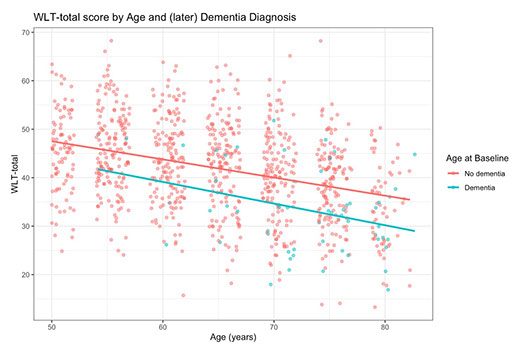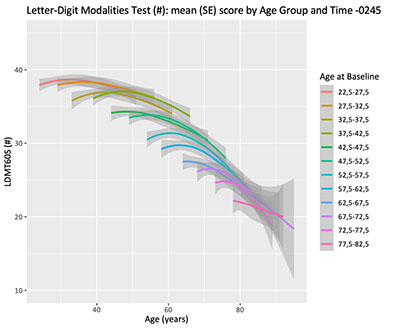

on the determinants of adult cognitive development
🇱🇺
Aging of cognitive abilities
MAAS is devoted to the age-related decline of memory and other cognitive functions in normal people and the factors that may be involved in this process. What determines a decline in memory function? Why do some individuals show a greater decline than others? Over the past years, a host of factors, including biological, medical, psychological and social variables, have been proposed to have an impact on adult cognitive development. MAAS tries to study these factors in an integrative way. This can be achieved only by studying large numbers of normal healthy adults of all ages and by monitoring them for several years.
Pathological cognitive aging
Some participants who were normal and healthy at the first measurement point eventually showed abnormalities. For this reason, MAAS intended to perform case-finding studies of pathological aging, involving subjects with well-documented histories of premorbid functioning. The longitudinal phase of MAAS focussed on prodromes of dementia (more specifically, dementia of the Alzheimer type or vascular dementia), and other kinds of psychopathology, such as depression.

A combination of cross-sectional and longitudinal research projects
The core study of MAAS involves the collection of information about individual patterns of cognitive aging. Data was collected in nearly 1,900 participants by means of postal surveys, questionnaires and laboratory assessments. The biomedical, psychological, and sociodemographical information can be linked to the outcome of extensive neuropsychological assessments. Four consecutive panel studies have been done (referred to as A1 to A4), each involving 440 to 480 individuals, stratified for age in 12 discrete age groups. In addition, several side-arm studies were performed that were linked to the main study, which involved dedicated experiments with smaller numbers of participants. Early 2023, the 6th and final follow-up measurement was concluded.

The diagram above shows the design of the study: four independent panel studies (named A1 to A4; black boxes) together make up the baseline assessment (F0). A1F0 was preceded by a large, independent population survey in 2,043 adults (red box). After 3 years, participants of 50 years and older took part in the first follow-up (F1). After 6 years (F2), everyone was invited again for the 2nd full follow-up measurement. At 9 years (F3), only a postal survey was done (red boxes), and at 12 and 25 years again a full follow-up in all remaining participants (F4 and F5, respectively).
Some findings
Results obtained so far have highlighted the role of specific health variables, such as diabetes, depressed mood, and exposure to neurotoxic substances that accelerate the cognitive aging process. Identified protective factors related to 'cognitive reserve' were a high level of educational attainment and both a rich social and professional environment. Cognitive abilities were strongly associated with sensory function (vision and hearing), in both cross-sectional and longitudinal studies.

Several findings have been and will be explored further in dedicated intervention studies aimed at the promotion of successful cognitive aging, e.g. in memory and goal management training programs for older adults.
More information about MAAS can be found in the 'Downloads' section, including a PDF of the introductory chapters of the 1995 MAAS book.
Figure on the left shows memory performance (15-Word Learning Test) of MAAS participants aged 50 years and older at baseline, who remained cognitively healthy (red) or who were diagnosed with dementia within 12 years after the baseline (but who were cognitively heathy at the start of the study). A significant difference in memory performance is already apparent at baseline between both groups.
The figure on the left shows the performance on the Letter-Digit Modalities Test (LDMT) in groups of different ages at baseline. LDMT is very sensitive to age effects. It is clear that cross-sectional and longitudinal age trends tend to overlap, but that a small 'learning effect' is apparent in the data: particularly younger individuals tend to improve their score at later stages in the study, while older participants profit less from this well-documented artifact of ageing studies. Grey borders demonstrate reliability boundaries of the group estimates.
© 2023 The Maastricht Aging Study - MAAS
MAAS is a longitudinal study into
the determinants of cognitive aging since 1991.
A 25 year follow-up was completed in 2023.